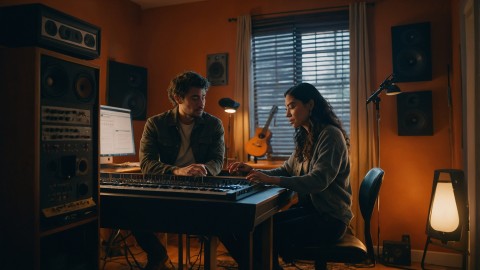Networking is an essential aspect of a successful career in the music industry. For recording artists, building and maintaining relationships with industry professionals, fellow musicians, and fans can open doors to new opportunities, collaborations, and resources. Effective networking can lead to increased visibility, support, and growth in an artist’s career.
Overview of the Music Industry Landscape
The music industry is a dynamic and ever-evolving field. With numerous players, including record labels, producers, managers, and media outlets, navigating this landscape can be challenging. However, understanding the importance of networking and building strong relationships can help artists thrive in this competitive environment.
Understanding Networking
Definition and Benefits of Networking
Networking involves creating and nurturing professional relationships that can be mutually beneficial. For recording artists, networking can lead to various benefits, such as access to industry knowledge, opportunities for collaboration, increased exposure, and support from peers and professionals.
Types of Networking: In-Person vs. Online
Networking can take place in person or online. In-person networking includes attending events, conferences, and meetups, while online networking involves engaging on social media platforms, forums, and virtual events. Both types are essential for a well-rounded networking strategy.
Preparing for Networking
Developing a Professional Persona
Before diving into networking, artists should develop a professional persona. This includes having a clear and consistent brand, an engaging online presence, and a polished personal appearance. A professional persona helps create a positive and lasting impression.
Creating an Impressive Portfolio
An impressive portfolio showcasing an artist’s work is crucial for networking. This can include recorded tracks, music videos, press coverage, and performance footage. A well-curated portfolio demonstrates an artist’s talent and achievements.
Setting Clear Networking Goals
Setting clear networking goals helps artists stay focused and motivated. Goals can include building specific connections, gaining mentorship, or securing performance opportunities. Having defined objectives makes networking efforts more purposeful and effective.
Building Relationships
Attending Industry Events
Industry events such as music festivals, conferences, and award shows provide excellent networking opportunities. Artists can meet industry professionals, gain insights, and establish connections that can lead to future collaborations and opportunities.
Joining Music Organizations and Collectives
Joining music organizations and collectives allows artists to connect with like-minded individuals. These groups often provide resources, support, and opportunities for collaboration, making them valuable networks for recording artists.
Utilizing Social Media Platforms
Social media platforms like Instagram, Twitter, and LinkedIn are powerful tools for networking. Artists can share their work, engage with fans and industry professionals, and stay updated on industry trends. Regular and authentic engagement on these platforms can help build a strong online network.
Engaging with Fans and Followers
Engaging with fans and followers is a crucial aspect of networking. Building a loyal fanbase can lead to increased support and exposure. Responding to comments, hosting live sessions, and sharing behind-the-scenes content can strengthen the artist-fan relationship.
Effective Networking Strategies
Crafting Your Elevator Pitch
An elevator pitch is a brief and compelling summary of who you are and what you do. Artists should have a well-prepared elevator pitch ready for networking situations. It should highlight key achievements, unique selling points, and current projects.
Active Listening and Engaging Conversations
Active listening and engaging in meaningful conversations are essential for effective networking. Showing genuine interest in others, asking thoughtful questions, and being an attentive listener can help build strong and lasting relationships.
Following Up and Staying in Touch
Following up with new contacts is crucial for maintaining connections. Sending a thank-you note, connecting on social media, or arranging a follow-up meeting can help keep the relationship alive. Regularly staying in touch ensures that the connection remains strong.
Offering Value to Your Network
Offering value to your network can strengthen relationships. This can include sharing useful information, providing support, or offering your skills and expertise. A mutually beneficial relationship is more likely to thrive and lead to long-term success.
Leveraging Industry Connections
Collaborations and Features
Collaborating with other artists and being featured on their projects can increase exposure and credibility. Industry connections can lead to opportunities for joint performances, co-writing sessions, and studio collaborations.
Gaining Exposure through Established Artists
Established artists can help emerging artists gain exposure. Mentorship, opening acts, and shout-outs from well-known artists can introduce an emerging artist to a wider audience and boost their career.
Access to Resources and Opportunities
Industry connections can provide access to valuable resources and opportunities. This includes studio time, promotional support, industry insights, and career advice. Leveraging these connections can accelerate an artist’s growth and success.

Navigating Challenges in Networking
Overcoming Shyness and Social Anxiety
Networking can be challenging for artists who are shy or have social anxiety. Practicing social skills, setting small goals, and seeking support from friends or mentors can help overcome these challenges. Gradually building confidence can make networking more manageable.
Dealing with Rejection and Setbacks
Rejection and setbacks are part of the networking process. Artists should view these experiences as learning opportunities and remain persistent. Developing resilience and maintaining a positive attitude can help artists continue to pursue their networking goals.
Balancing Authenticity and Professionalism
Balancing authenticity and professionalism is crucial in networking. Artists should be genuine and true to themselves while maintaining a professional demeanor. Building authentic relationships based on mutual respect and trust can lead to long-term success.
Success Stories
Case Study: Successful Networking Stories of Famous Artists
Many famous artists have built their careers through effective networking. For example, Ed Sheeran’s relentless networking efforts, including performing at numerous open mics and building connections with industry professionals, played a significant role in his rise to fame.
Personal Accounts from Emerging Artists
Emerging artists often share stories of how networking has helped them gain opportunities and grow their careers. These personal accounts highlight the importance of building and nurturing relationships within the industry.
Expert Insights
Tips from Industry Professionals
Industry professionals often emphasize the importance of networking. Tips from managers, producers, and successful artists can provide valuable insights into effective networking strategies and best practices.
Quotes from Successful Musicians
Quotes from successful musicians about their networking experiences can inspire and motivate artists. These quotes often highlight the impact of relationships and connections on their careers.
Conclusion
Recap of Key Points
Networking is essential for recording artists to build relationships, gain exposure, and access opportunities. Developing a professional persona, attending industry events, engaging on social media, and maintaining authentic connections are crucial aspects of effective networking.
Encouragement to Start Networking
Artists should be proactive in their networking efforts and remain persistent despite challenges. By building and nurturing relationships, artists can create a supportive network that helps them achieve their career goals and thrive in the music industry.ow it. So if you find water somewhere else, it becomes a remarkable draw to look closer to see if life of any kind is there, even if it’s bacterial, which would be extraordinary for the field of biology.We don’t want tradition. We want to livein the present and the only history that is worth a tinker’s dam is the history we make today.










